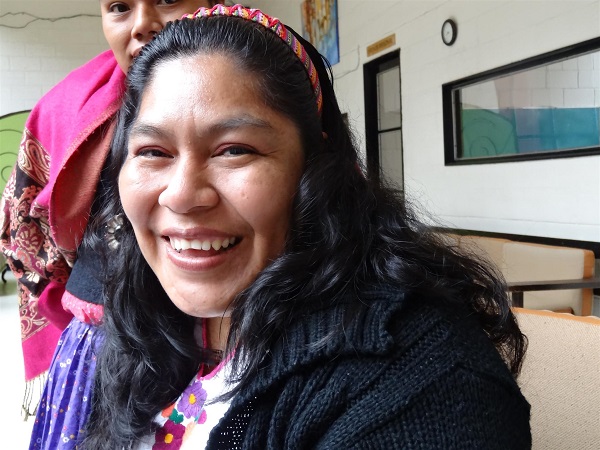“You can join the meeting but you can’t speak.”
This is what a town mayor told Dalila Vazquez and her fellow Madre Tierra members when they attended a meeting in their own community. It wasn’t the first time men had tried to silence them and it probably won’t be the last, but Madre Tierra members have refused to back down.
Dalila is one of the leaders of Madre Tierra (Mother Earth), an organization that advocates for rural and indigenous women’s equal access to land in La Lupita community, a right that Guatemalan women have on paper but not always in practice. Many barriers stand in their way, including a cultural norm that puts the purchase of land strictly in the male domain, pushback from leaders who refuse to take women’s perspectives seriously, and the discrimination and harassment women activists face not only from civic authorities but also from men within their own organizations and movements. In short, it’s not easy for women land activists to break through the cacophony of misogyny and bureaucracy, but that’s exactly what Dalila and Madre Tierra continue to do.
Patriarchy and racism are like two big umbrellas that we have not only internalized, but that are there, mainly affecting women.
Women like Dalila are at the forefront of environmental justice efforts where they live, but they do not have a seat at the table. They are leading the fight to protect their land from mining, oil and other multinational companies whose projects in the name of “development” are destroying basic livelihoods and the cultural foundation of their communities. In response, they face threats of violence and are accused of hampering development and stalling progress. As indigenous women, Dalila and her colleagues experience both racism and sexism. People in power assume their race and their gender make them ignorant and therefore, easy to ignore.
Rural, indigenous and peasant women are seen as ignorant, as we if we don’t know anything, so they [government officials] don’t attend us if we’re not accompanied by a high profile person.
At JASS, we know that where rural and indigenous women lead, we must follow. Through our Alquimia Feminist Leadership Schools and as co-coordinators of the Mesoamerican Women Human Rights Defenders Initiative, we accompany and strengthen women activists in Guatemala and across the Mesoamerican region as they organize to save our future. Through collective action, these activists advocate for women in their communities while strengthening their political leadership. Through Alquimia, they find allies in each other, while sharing strategies of resistance and building solidarity.
Dalila, representing Madre Tierra, was one of the first 22 indigenous and rural women from seven Mesoamerican countries to participate in the Alquimia leadership training. This cohort of feminist activists learned that one woman or one organization could cause a ripple, but as a network, they could create waves. Sharing with other women from different countries whose ideas and strategies emerged from different experiences was an enriching process for all participants, including Dalila. It allowed them to go beyond knowledge-building and address other fundamental dimensions that are often overlooked in training and organizational processes.
Being able to share, get to know, and exchange, makes us ground ourselves in what we are, what we want and what we’re seeking to achieve. For me this is very important, being able to maintain that spiritual connection, that connection between each other, without competition, but rather the contrary, complementing each other.
Collective action did not end when the Alquimistas met for their final course in 2016. In fact, the participants identified so strongly with each other as allies and benefited from the solidarity that grew out of sharing their stories, experiences, and creative strategies for resistance that they decided to form an alliance. Still active today, the Mesoamerican Indigenous, Rural, and Mestiza Women’s Alliance provides mutual support to its members. Crucially, the Alliance collaborates with JASS Mesoamerica to adapt the training and leadership support at the country level.
For JASS, the Alquimia schools have been a way to facilitate and open spaces for women defenders to share their stories, challenges, strategies, and goals with other women, a fundamental and sustaining tool to ensure that women are safe and strong in their organizing efforts. Though there is still a long path to tread in the defense of rural women’s rights, experiences like Dalila’s show us that when women amplify their voices and collectively build power to advance their rights, they are capable of facing challenges and transforming not only their lives, but also their communities.


























